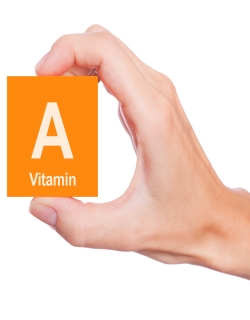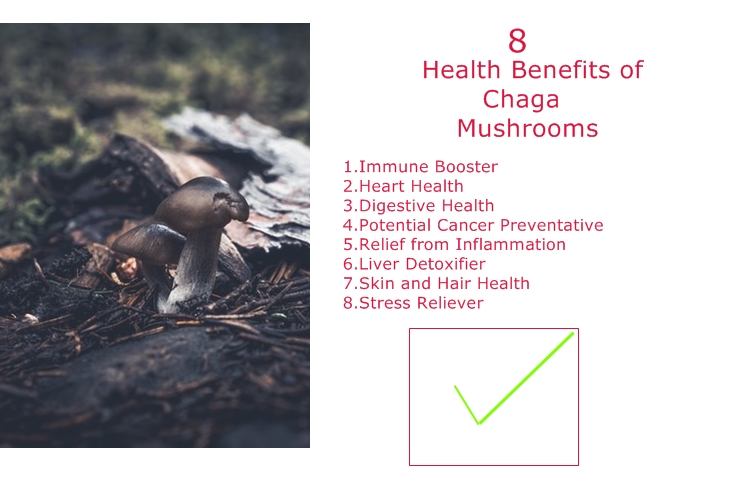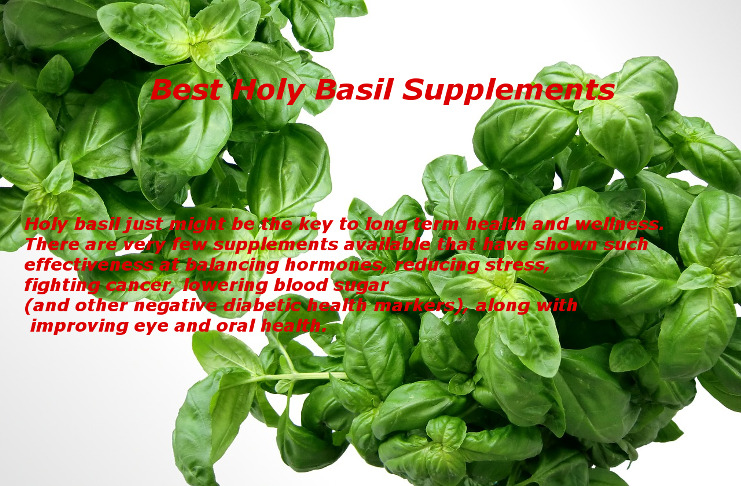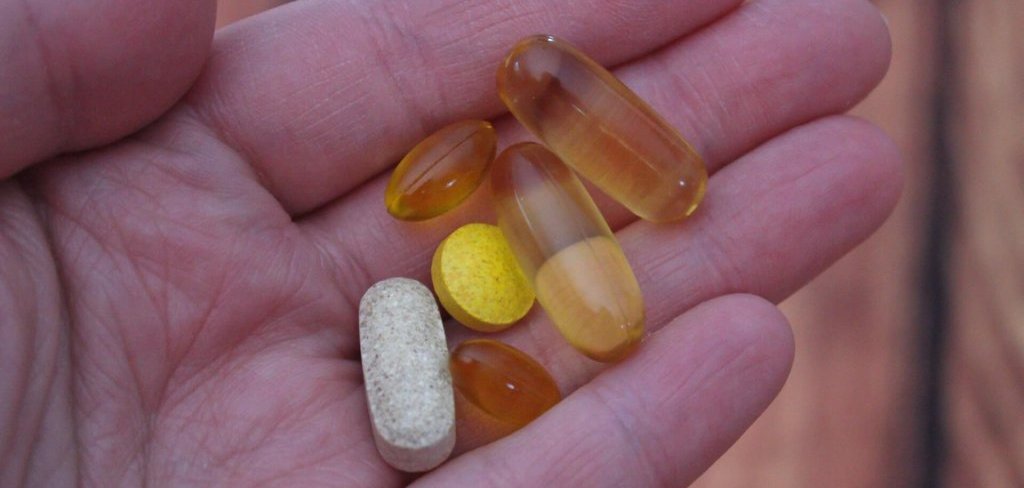 Vitamin A is a fat-soluble vitamin that’s essential to our good health. It’s used for a variety of growth and healing purposes in the body. In fact, close to 700,000 children never live to see their fifth birthday every year because they don’t get enough vitamin A (“retinol”) in their diet. Keep reading to learn more about this further down the page.(1)
Vitamin A is a fat-soluble vitamin that’s essential to our good health. It’s used for a variety of growth and healing purposes in the body. In fact, close to 700,000 children never live to see their fifth birthday every year because they don’t get enough vitamin A (“retinol”) in their diet. Keep reading to learn more about this further down the page.(1)
Severe deficiencies are less common in developed countries, but still occur due to poor diet lacking in the healthy fatty foods like fish and animal livers, and eggs that contain it. The body can also make vitamin A using dietary carotenoids that come from leafy greens and colorful vegetables, but they’re not converted very effectively. Meaning that even a “healthy” vegetarian diet that’s high in leafy greens and carotenoid-rich veggies puts you at great risk of vitamin A deficiency and its many negative side-effects on your health.
Keep reading to learn more about vitamin A: what it is, risk factors for deficiency, foods that contain it, and our list of recommended topical and dietary supplements.
What is Vitamin A?
Vitamin A is needed for the growth and development of every cell in our body. It’s also essential for good vision, bone growth and regulation, immune system function, gene expression, skin health, blood cell maintenance (called “Haematopoiesis”), and the development of fetuses in pregnant mothers.(2)
Vitamin A can be split into two different groups that include the vitamin itself, found in animal fat and a group of several pro-vitamins.
• Retinol:
This form of the vitamin is easily absorbed and ready to use by the body. It’s important to read vitamin labels to identify whether you’re consuming ready-made retinol or a provitamin that can be used to make it in the body. Always stick to the dietary guidelines recommended for your age group or condition, to avoid symptoms of too much called “hypervitaminosis-A”.
• Provitamins:
beta-carotene, alpha-carotene and beta-cryptothaxin: All herbivores and omnivores can convert these pro-vitamin A “carotenoids” into vitamin A in the absence of ready-to-use animal and fish sources. These fat soluble pro-vitamins are abundant in colorful fruits and vegetables. They also act as antioxidants throughout the body and due to their low rate of conversion to vitamin A, there is no danger from consuming excessive pro-vitamin A carotenoids.
There are also synthetic forms of retinol. The most common brand names you’ll find are: Retin-A (Tretinoin) and Accutane (Isotretinoin). Both are commonly prescribed for persistent acne that’s shown to be resistant to all other forms of treatment. However, Retina-A is also often used in age-defying serums and creams, and has also been used to treat acute promyelocytic leukemia (learn more).
Best Vitamin A Supplements to Take
#1 View View |
#2 View View |
#3 View View |
#4 View View |
#5 View View |
#6 View View |
|
| Brand | Now Foods | Nature’s Way | Nature Made | Spring Valley | Seeking Health | BulkSupplements |
| Overall Rating | 5 / 5 | 4.9 / 5 | 4.5 / 5 | 4.0 / 5 | 5 / 5 | 5 / 5 |
| Serving Size | 1 Softgel | 1 Softgel | 1 Softgel | 1 Softgel | 1 Drop | 55miligrams |
| Price/Serving | $0.07 | $0.07 | $0.05 | $0.03 | $0.04 | $0.10 |
| Effectiveness | 5 / 5 | 5 / 5 | 4.5 / 5 | 4.0 / 5 | 5 / 5 | 5 / 5 |
| Quality | 5 / 5 | 5 / 5 | 4.0 / 5 | 4.5 / 5 | 5 / 5 | 5 / 5 |
| Taste | 5 / 5 | 5 / 5 | 4.0 / 5 | 4.5 / 5 | 4.0 / 5 | 4.5 / 5 |
| Digestibility | 5 / 5 | 5 / 5 | 4.0 / 5 | 4.0 / 5 | 5 / 5 | 4.5 / 5 |
Health Benefits of Vitamin A
1. Eye Health:
The light sensing layer of our eyes, called the “retina” uses retinol (vitamin A), combined with two specific proteins (opsin and rhodopsin) to help us see in low light conditions and is also crucial for the eye’s ability to differentiate between different colors. Vitamin A also helps to keep our eyes moist. Dry eyes and/or poor night vision are early warning signs of deficiency.(3)
2. Strong Teeth and Bones:
Vitamin A is used in the formation of the dentin and marrow inside our teeth and bones. It also works hand-in-hand with vitamin D to help regulate calcium levels in the bones to prevent it from leaching out. The balance between vitamin’s A and D in the body are crucial though and too much “A” without enough “D” for long periods can cause osteoporosis and hip fractures.(4)
3. Strengthens Immune System:
Vitamin A helps to form the lymphocytes in our immune system before we’re born. Children born with low levels of vitamin A because of a malnourished mother often have lifelong problems fighting off infection, even if the deficiency is detected and treated right after birth. After birth, vitamin A is used in the formation of epithelial tissue, monocytes, macrophages, NK cells, neutrophils, T and B lymphocytes, T cell production, T and B cell production, and more (5).
4. Silky Smooth, Youthful Skin:
Some vitamin A that we consume is converted to retinoic acid. Retinoic acid tells our immature skin cells (called keratinocytes) to mature into epidermal and dermal cells. This is not only essential for maintaining an essential glow and elasticity to the skin, but also for propagating the healing process when we’re cut or scratched. Applied topically, vitamin A helps to treat a variety of skin conditions like eczema and psoriasis by speeding up the turnover of skin cells.(6)
5. Effective Acne Treatment:
Because of its ability to increase the speed at which skin cells mature, vitamin A: taken internally and/or applied externally, is one of the best acne treatments available. There are a few prescription-only treatments for acne that use synthetic vitamin A (“Retin-A” or “Accutane”). People with persistent acne who don’t care for the over-drying effects that these medications cause often turn to natural vitamin A supplements and creams and have great success with them.(7)
6. Antioxidant Benefits:
Vitamin A is used in the body to fight free radicals from oxidizing our tissues and causing premature aging. It’s also used in the blood to fight oxidation of triglycerides and LDL cholesterol, both of which lead to narrowing of the arteries and heart disease.(8)
7. Cancer Fighting:
There’s a primary link between uncontrolled oxidation and cancer, meaning adequate intake of this vitamin offers anti-cancer benefits (9).
8. Healthier Babies:
Due to all its functions in helping bones to grow, the formation and maintenance of the immune system, the formation and maintenance of the eyes, the formation and maintenance of the skin, and so forth; adequate intake of this vitamin is critical for pregnant mothers who want to ensure their baby is born in good health. Read the section on deficiencies further down the page to learn more about the dangers to children who don’t get enough.(10)
How Much Vitamin A Should You Take Every Day?
| Age Group | RDA | Safe Limit |
| Children | ||
| < 1 year | 500 μg (20,000 iu) | 600 μg (24,000 iu) |
| 1 – 3 years | 300 μg (12,000 iu) | 600 μg (24,000 iu) |
| 4 – 8 years | 400 μg (16,000 iu) | 900 μg (36,000 iu) |
| Males | ||
| 9 – 13 years | 600 μg (24,000 iu) | 1700 μg (68,000 iu) |
| 14 – 70 years | 700 μg (28,000 iu) | 3000 μg (120,000 iu) |
| Females | ||
| 9 – 13 years | 600 μg (24,000 iu) | 1700 μg (68,000 iu) |
| 14 – 70 years | 700 μg (28,000 iu) | 3000 μg (120,000 iu) |
| Pregnant | 750 μg (30,000 iu) | 3000 μg (120,000 iu) |
| Breastfeeding | 1200 μg (48,000 iu) | 3000 μg (120,000 iu) |
Warning About Hypervitaminosis-A
The safe limit listed in the table above shouldn’t be ignored. In fact, it’s important to carefully adhere to the maximum daily dosages for all fat-soluble vitamins, since they accumulate and are held in the body, and aren’t flushed out as quickly as water soluble vitamins like vitamin C.
Consuming as little as 15,000 μg daily can cause symptoms of hypervitaminosis-A to occur including: insomnia, irritability, diarrhea, fever, anemia, bone fractures, hair loss, nausea, headaches, blurred vision, weight loss, drowsiness, muscle weakness and changes in your psychological well-being, and others.
Consuming doses beyond 120,000 μg can lead to many of the symptoms mentioned above to become life-threatening if levels in the body aren’t lowered quickly. Hypervitaminosis-A isn’t a concern if you’re applying this vitamin topically using a cream, lotion or serum.
Note About Severe Vitamin A Deficiencies
With vitamin A it should be obvious that too much is definitely NOT a good thing. However, due to poor diets high in processed food and sugar-laden treats, and not enough quality animal and vegetable sources, deficiencies still exist. In fact, it’s estimated that a severe vitamin A deficiency claims the lives of close to 700,000 children under the age of 5 every year, with another 250,000 – 500,000 children in under-developed countries going blind in that same time frame due to deficiencies (11).
Night blindness is usually the first symptom to develop when you’ve become seriously depleted, with eventual blindness sure to follow if the deficiency isn’t corrected in time. A severe lack of this vitamin also leads to reduced immune-system function, poor bone density, diminished resistance to cancer cells, and a host of birth defects when pregnant mothers fail to get adequate doses.
Natural Sources of Vitamin A and Carotenoids
Animal Sources of Retinol:
Cod Liver Oil (13502 μg per 14g) – one tablespoon
Cod liver oil has more vitamin A than any other natural source. In fact, it has way too much if taken in pure form. Cases of hypervitaminosis-A are most prevalent in people who consume cod liver oil. This wasn’t always the case, in fact back in the 1930’s and long before that, cod liver oil was considered a very healthy way to get more vitamin’s A and D in one’s diet. Vitamin A and D work in tandem together. Without enough D, vitamin A becomes toxic to the body (ie., hypervitaminosis-A).
*Nowadays, the ratio of these two vitamins is very skewed in most cod liver oils because of modern processing methods (12) and you have to choose it carefully if you’re going to use it as a source of vitamin’s A or D. The supplements we recommend later use cod liver oil as a source, but the vitamin A is extracted from the oil, not in pure form such as you’ll find in a bottle of cod liver oil where you measure your dose by the spoonful.
Turkey Liver (8058 μg per 100g) – palm sized
This is another source that’s best avoided, as a small 100g serving provides at least triple the upper limit of vitamin A for all age groups, and way too much for infants and children. If you like turkey liver, it isn’t dangerous to eat it once in a while, just don’t eat it daily.
Fish, Beef, Pork Liver (6500 μg per 100g) – palm sized
Over double the upper recommended daily consumption limit for vitamin A. As with turkey liver, these fish and animal livers can be eaten occasionally, but should be avoided as a daily meal.
Butter (684 μg per 100g) – 21 teaspoons
While 100g (21 teaspoons!) of butter may seem like an enticing and delicious way to get your vitamin A, that’s a heck of a lot of calories just to get ~70% of your RDA.
Eggs (140 μg per 100g) – approximately 2 regular eggs
Eggs aren’t a huge source of vitamin A, but eating a couple every morning is a good way for most people to get a third or more of their daily needs.
Plant Sources of Carotenoids:
Note: Carotenoids are essential for other processes such as their use in eliminating dangerous free radicals in the body. There are a lot of factors that can limit the conversion of carotenoids to vitamin A in the body, depending on your level of health. Cooking, cleaning and storage of the various foods that contain them also affects how much you’re getting. Learn more about factors that help/hinder absorbtion and how to store and prepare these foods here.
Dandelion Stems (5588 IU per 100g) – 3 cups chopped
While 100g still has over 100% of the recommended dose, 100g grams is a lot of dandelions! Most people wouldn’t be able to regularly choke back this much per day (they don’t taste very good) but including a few stems in your salad or smoothie every day is perfectly fine.
Sweet Potato (961 μg per 100g) – ½ cup mashed
One or two of these every day is perfectly fine and a great way to supplement your diet with more vitamin A – along with several other beneficial nutrients.
Carrots (835 μg per 100g) – ¾ cup chopped
Carrots are another great source of vitamin A, without being overwhelming in their “A” content.
Broccoli Leaves (800 μg per 100g) – 1 ½ cups
If you grow your own broccoli, the leaves are a great source of vitamin A, offering over 90% the RDA in a 100g (1 ½ cup) serving. Don’t mistake the leaves with the florets which are the “broccoli” you’ll find at the supermarket. Florets aren’t a significant source of “A”.
Kale (681 μg per 100g) – 1 ½ cups
Kale is a perfectly fine and safe source of vitamin A. Eat til your heart’s content!
Spinach (469 μg 52%) – 3 cups
Yet another great food for getting your daily dose of vitamin A, without taking in too much.
Pumpkin (400 μg per 100g) – 1 cup mashed
Pumpkin is another very safe source of vitamin A.
Less Significant Dietary Sources
• Collard Greens (333 μg per 100g)
• Cheddar Cheese (265 μg per 100g)
• Cantaloupe (169 μg per 100g)
• Apricot (96 μg per 100g)
Vitamin A Supplements: 3 Pre-Purchase Considerations
1. Company Reputation:
Only buy supplements from a manufacturer known for delivering a quality product. Read real reviews from real people using Amazon, Ebay and health forum reviews along with social media noise about the companies you intend to purchase from, to get a good understanding of their history and customer service practises. If the company has a good reputation, you don’t really need to worry about the other two considerations listed in this section.
2. Type:
The type of vitamin A in the supplements you buy is very important. Look for “Vitamin A” or “Retinol” specifically on the label. Some companies will list carotenoids as vitamin A in big bold letters and try to trick you. Legally, they must divulge this to you though, normally in brackets and in faded print. Look for “Vitamin A (as carotenoid)” and avoid these products as carotenoids aren’t converted very well.
3. Dose:
Vitamin A is super important to health. However, too much is counter-intuitive to good health and the very problems you’re trying to avoid are also the same effects that will occur if you consume too much over time. Read the dosage table provided earlier in this article and stay within the safe upper limit listed. If you get plenty of the dietary sources of pure vitamin A such as animal liver and eggs, don’t choose a supplement that exceeds your upper limit unless advised otherwise by your doctor.
Vitamin A Supplement Reviews
#1.Now Foods Vitamin A, 25000 IU from Fish liver oil – Best Vitamin A Capsules

These Now Foods’ soft gels are very popular with people who have embarrassing and painful acne that can’t be treated with conventional washes or creams, but who also don’t want to resort to aggressive Retin-A or Accutane topical treatments.
This product is made from pure cod, haddock and pollock livers and contains no vitamin D. Each soft gel contains the safe upper limit of vitamin A for most age groups (25,000 iu) and cost a mere 4 cents per dose. This is also a great way to supplement your eye, respiratory, immune and bone health on the cheap every day. These soft gels do contain soybean oil, so avoid if you have allergies to this plant.
#2.Nature’s Way Vitamin A 10,000 IU , 100 Softgels

Nature’s Way makes some of the best all natural supplements on the market. These soft gels contain a very safe and healthy dose of just 10,000 iu per serving, perfect for children or others who don’t need too much extra “A” but still want to avoid becoming deficient. This is also the perfect dose for most dogs who have low levels of retinol in their body (consult your vet before deciding your dog needs it though).
The potency listed on each bottle of their products is tested and certified to be accurate. As with the others on this page, the vitamin A in each gel comes from fish liver and contains no vitamin D.
#3.Nature Made Vitamin A, 8000 IU

These soft gels from Nature Made are perfect if you just want a little extra vitamin A to supplement your diet. Each dose contains just 8,000 iu of vitamin A, extracted from fish liver.
Because they contain less of the vitamin itself, they’re also small-sized making them much easier to swallow than other products. The low iu count also makes this a perfect vitamin A supplement for children.
It’s marketed as an eye-health booster, but you can expect to reap all the benefits of getting enough retinol in your diet when buying this affordable 100-count bottle from Nature Made.
#4.Spring Valley – Vitamin A 8000 IU

This is another vitamin A supplement that offers a lower iu count, at just 8,000 iu per soft gel serving.
The vitamin A is extracted from fish livers and sardines. People who use any Spring Valley product are always satisfied and these soft gels are no exception, with a 4.3 star rating on Amazon right now. There’s really no arguing with the price either, at just $2.60 per 250 count!
#5.Vitamin A Drops | Pure Vitamin A | 5,025 IU Per Drop | Seeking Health – Best Vitamin A Drops

Not everyone likes to swallow pills and capsules. This dropper allows you to swallow your daily dose of vitamin A more easily, either straight, or in your favorite cold beverages. Each drop gives a reasonably small, yet healthful dose of 5,025 iu’s of vitamin A extracted from fish liver.
This product is handy if you don’t like pills, can’t swallow them due to problems with your esophagus or if your pediatrician has recommended a small dose for your child. The one drawback with using a dropper is that you do have to be a little more conscious about dosing, as it’s easy to mistakenly take an extra drop if you’re not paying careful attention.
#6.BulkSupplements Pure Vitamin A Palmitate Powder – Best Vitamin A Powder

This bulk powder form of vitamin A can be used to add to your own homemade skin creams and serums, or to add to drinks and foods. Each 55 mg serving has a reasonably small dose of vitamin A, at 15,000 iu. You won’t find a more affordable way to get your daily dose of “A” than this bag of powder from the folks at Bulk Supplements.
There are a couple of inconveniences to the cost savings though. First, you’ll either need a milligram food scale or a 1/64 teaspoon in order to carefully measure the product. Second, you have to eat this supplement with a fat source (remember that vitamin A is a fat-soluble vitamin) such as a teaspoon of olive or coconut oil, as it’s a synthetic and doesn’t have the fish fats that the others mentioned on the page do.
Best Vitamin A Creams For Beautiful Skin
1.Retinol Cream (Vitamin A 100,000 Iu Per Ounce)

This high quality retinol cream from Good n Natural is just what the dermatologist ordered for the skin on your face and neck!
It’s very inexpensive at just over $3 per ounce and the company offers amazing discounts if you order in bulk. This cream has 200,000 iu of topical vitamin A in every 2oz jar. Best, it has other skin nourishing ingredients like coconut oil, glycerin, mineral oil and vitamin E.
Use this retinal cream to smooth out the texture of your skin, smooth fine lines and lighten dark under eye circles. It’s best used as a night cream, to help repair and rejuvenate your skin while you sleep and has more positive reviews than nearly any other product to be found.
2.MyChelle Dermaceuticals Vitamin A Plus Serum

This twice weekly rejuvenating serum from MyChelle is more aggressive than the nightly retinol cream from Good n Natural.
It’s fortified with a wealth of extra ingredients that are proven to accelerate skin cell turnover, while moisturizing at the same time. Many high-end retinol serums are known for drying the skin, whereas MyChelle has a reputation for causing less skin drying and irritation. They also use a high-end formulation without the high-end price tag.
Ingredients include: retinol, glycerin, rose hip oil, cloudberry seed oil, argan oil, vigna seed extract, citrus, and witch hazel to increase the tone of your skin. This serum works much faster to rid the skin on your face of fine lines, wrinkles, discoloration (dark circles, age spots), acne and acne scars. As stated already, this is an aggressive treatment and you can’t use it every day.
Conclusion
As you’ve hopefully gathered after reading all the information we’ve laid out for you, vitamin A supplementation isn’t something that everyone needs to do. While it’s perfectly fine for anyone to use a vitamin A cream, lotion or age-defying serum, taking vitamin A supplements internally is something that needs to be done with care.
If you’ve had blood tests that confirm you or a loved one are deficient, follow your doctor’s dosage recommendations. They’ll usually recommend you use a supplement that offers a large dose close to the upper tolerable limit for a set time, before scaling back to the RDA dosage. If you eat plenty of animal sources like animal livers and eggs, choose a vitamin A supplement that offers a low dose which doesn’t exceed the RDA for your age or lifestyle group.





Another good article. Doing all of that has helped me tremendously with IBS-C.
Fat soluble vitamins found in animal fat are the real deal??